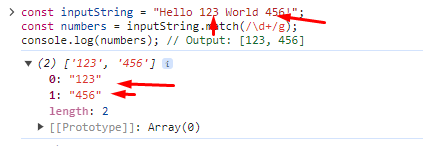Getting Numbers from a String in JavaScript using Regular Expressions (Regex)
JavaScript, being a versatile and dynamic programming language, often requires developers to manipulate strings and extract specific information from them. When dealing with strings that contain a mixture of alphanumeric characters, symbols, and numbers, extracting only the numeric values becomes a common task. One powerful tool for achieving this is Regular Expressions, commonly known as Regex.
A Regular Expression is a sequence of characters that defines a search pattern. In JavaScript, Regex is often used for string manipulation and pattern matching. When it comes to extracting numbers from a string, Regex provides a concise and efficient solution.
Let's start with a simple example where we want to extract all the numbers from a given string.
const inputString = "Hello 123 World 456!";
const numbers = inputString.match(/\d+/g);
console.log(numbers); // Output: [123, 456]
In this example, the regular expression /\d+/g is used. Here's a breakdown of the components:
1- \d: Matches any digit (0-9).
2- +: Matches one or more occurrences of the preceding digit.
3- g: Performs a global search, finding all matches in the input string.

If you need to extract decimal numbers as well, you can modify the regular expression:
const inputString = "Extract 12.34 and 56.78 from this string.";
const decimalNumbers = inputString.match(/\d+\.\d+/g);
console.log(decimalNumbers); // Output: [12.34, 56.78]
Here, \d+\.\d+ captures one or more digits followed by a dot and one or more digits after the dot, effectively matching decimal numbers.

To include negative numbers in your extraction, you can enhance the regular expression further:
const inputString = "Find -5 and -10 in this text.";
const negativeNumbers = inputString.match(/-?\d+/g);
console.log(negativeNumbers); // Output: [-5, -10]
In this case, -? makes the minus sign optional, allowing the regex to match both positive and negative integers.

If your string contains numbers with thousands separators (e.g., "1,000"), you can adjust the regex accordingly:
const inputString = "Extract 1,000 and 2,500 from this string.";
const numbersWithSeparator = inputString.match(/\d{1,3}(,\d{3})*(\.\d+)?/g);
console.log(numbersWithSeparator); // Output: ["1,000", "2,500"]
Here, \d{1,3}(,\d{3})*(\.\d+)? captures numbers with optional thousands separators and an optional decimal part.

Regular Expressions provide a powerful and flexible way to extract numbers from strings in JavaScript. By crafting appropriate regex patterns, developers can handle various scenarios and efficiently retrieve numeric values from complex strings. Understanding the basics of regex and experimenting with different patterns will empower you to tackle specific requirements in your JavaScript projects.